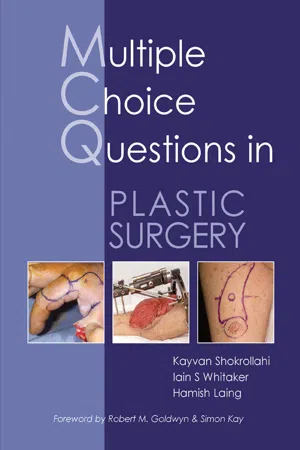
- English
- ePUB (mobile friendly)
- Available on iOS & Android
About this book
Multiple Choice Questions in Plastic Surgery provides over 400 questions, answers and explanations covering the breadth of plastic and reconstructive surgery including burns. The expansive array of questions with detailed explanations and references will provide a solid foundation for those preparing for final specialty examinations such as the American Boards, the FRCS (Plast), EBOPRAS, MCh and others. The questions are drawn from international experts and are up-to-date with the latest concepts and techniques, including face transplantation, new trends in reconstructive and aesthetic surgery, and recent scientific advances. It will therefore appeal to those interested in plastic surgery education globally. In particular, it will help plastic surgeons to keep up-to-date in the specialty, and demonstrate this through continuing medical education (CME) and for processes of revalidation.
Tools to learn more effectively

Saving Books

Keyword Search

Annotating Text

Listen to it instead
Information
Section 1 questions
Basic principles and basic science
| 1 | Which one of the following is true regarding collagen? |
| A. | Its derivation is debated: either from the Greek for ‘strength’ or the Latin for ‘strand’. |
| B. | Type 1 collagen is formed from three identical ‘alpha’ chains. |
| C. | Type 3 collagen is formed from two different ‘alpha’ chains. |
| D. | Every third amino acid in collagen is glycine, the others usually being proline and hydroxyproline. |
| E. | Collagen is stabilized by polymerization. |
| 2 | With regards to anticoagulants in microsurgery: |
| A. | Heparin and antithrombin III have similar mechanisms of action. |
| B. | Unfractionated and fractionated heparins have different proportions of anti-Factor Xa and antithrombin activity. |
| C. | Heparin-induced thrombocytopenia is a more frequent complication of unfractionated prophylactic heparin than of fractionated prophylactic heparin use. |
| D. | The antiplatelet drug aspirin is contraindicated in patients younger than 16 years of age. |
| E. | Dextran anticoagulation is pharmacologically reversible. |
| 3 | Which landmark publication related to free tissue transfer is correct? |
| A. | The first successful thumb replantation was performed by Komatsu and Tamai in 1967. |
| B. | The first clinical series of free tissue transfers was published by Nakayama in 1969. |
| C. | Cobbett performed the first successful free great toe-to-hand transfer in humans in 1968. |
| D. | McLean and Buncke performed the first free omentum flap in 1971. |
| E. | None of the above is true. |
| 4 | Concerning composite tissue allotransplantation, which of the following is true? |
| A. | Corticosteroids are used for both maintenance therapy and treatment of acute rejection episodes and act by inhibiting NF-κB activation and inflammatory cytokine production. |
| B. | Antithymocyte globulin (ATG) is an induction agent which binds cell surface antigens, and depletes T cells. |
| C. | Tacrolimus (FK 506) blocks the production of IL-2 and has been shown in recent studies to possibly speed up nerve regrowth. |
| D. | Mycophenolate mofetil (MMF) prevents T-cell proliferation and differentiation. |
| E. | All of the above. |
| 5 | In relation to free tissue transfer, which one is true? |
| A. | The anterolateral thigh free flap, by definition, is based on the descending branch of the lateral circumflex femoral artery. |
| B. | The superficial inferior epigastric artery pedicle is absent in approximately 5% of cases. |
| C. | The skin paddle of the fibula osteoseptocutaneous free flap is an unreliable indicator of the blood supply to the fibula bone. |
| D. | Some surgeons are capable of performing microsurgery without the aid of a surgical microscope. |
| E. | None of the above is true. |
| 6 | According to Mathes and Nahai: |
| A. | The posterior interosseous artery flap is a Type C fasciocutaneous flap. |
| B. | The lateral arm flap is a Type C fasciocutaneous flap. |
| C. | The scapular flap is a Type C fascioc... |
Table of contents
- Cover Page
- Title Page
- Copyright Page
- Contents
- Foreword
- Contributors
- Preface
- About the editors
- Acknowledgements
- Guidance notes
- Section 1: Basic principles and basic science Questions
- Section 2: Hand surgery Questions
- Section 3: Aesthetic surgery Questions
- Section 4: Breast, trunk and perineum Questions
- Section 5: Burns and trauma Questions
- Section 6: Reconstructive head and neck surgery Questions
- Section 7: Cutaneous malignancy and sarcoma Questions
- Section 8: Paediatric plastic surgery Questions
- Section 9: History of plastic surgery Questions
Frequently asked questions
- Essential is ideal for learners and professionals who enjoy exploring a wide range of subjects. Access the Essential Library with 800,000+ trusted titles and best-sellers across business, personal growth, and the humanities. Includes unlimited reading time and Standard Read Aloud voice.
- Complete: Perfect for advanced learners and researchers needing full, unrestricted access. Unlock 1.4M+ books across hundreds of subjects, including academic and specialized titles. The Complete Plan also includes advanced features like Premium Read Aloud and Research Assistant.
Please note we cannot support devices running on iOS 13 and Android 7 or earlier. Learn more about using the app